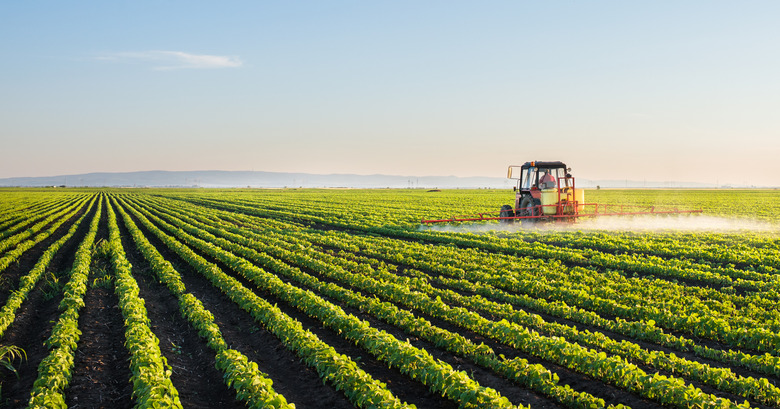What Are The Benefits Of Agriculture And Farmers?
Humans once subsisted by hunting and gathering, foraging for available food wherever it could be found. These early peoples necessarily moved frequently, as food sources changed, became scarce or moved in the case of animals. This left little time to pursue anything other than survival and a peripatetic lifestyle. Human society changed dramatically approximately 12,000 years ago, possibly related to the ending of the last ice age, when agriculture began. People began planting collected seeds, harvesting them and selecting successful crops. This encouraged people to make permanent homes. With a settled lifestyle, other pursuits flourished, essentially beginning modern civilization.
TL;DR (Too Long; Didn't Read)
Agriculture gave people the opportunity to create civilizations, fight hunger and work to combat challenges in population growth and climate change.
Early Agriculture
Early Agriculture
Early farmers domesticated cereals, fruits, vegetables and animals. This helped to preserve many species selected for their high nutrient content and reliable harvests. In turn, the stable food supply created by farms kept people from starving, and in fact led to a rapid increase in population around the world.
Modern Agriculture's Opportunities
Modern Agriculture's Opportunities
While at first farms grew a large variety of foods depending on their location, this eventually changed with the advent of rail transportation in the 19th century. Once rapid transport of crops began, a shift in farming methods took hold. An emphasis on producing high yields of a few reliable grain types resulted in a reduction in global hunger.
Today, agriculture relies on global trade. As the human population approaches 10 billion people by 2050, agriculture is poised to continue growth to meet the demand for food. Farming creates opportunities to lift people out of poverty in developing nations. Over 60 percent of the world's working poor works in agriculture. Farming creates more jobs, beginning with farmers, and continuing with farm equipment makers, food processing plants, transportation, infrastructure and manufacturing.
Developments in Farming Sustainability
Developments in Farming Sustainability
Modern agriculture's huge reliance upon a few crops invites challenges, given changes in climate and the potential for harvest failures. New farming endeavors promise to battle the opposing problems of both malnutrition and obesity. To create better crop diversity for human health and food security, farmers are working to create markets for new crops. More environmentally friendly farming techniques offset climate challenges and protect local ecological systems while securing the food and water supply. Sustainable farming methods create better food diversity, preserve water with more efficient facilities and drought-tolerant crops, and encourage better livestock health. Farmers represent a front line to defend against the risks of climate change.
Organic agriculture forges a path for sustainable food supplies. Organic farmers work to improve soil fertility by rotating crops, using cover crops and tilling the soil. By not using pesticides, farmers allow groundwater to maintain greater quality and cleanliness. These methods encourage biodiversity in crops, maintain more natural environments in and around farms, and create habitats for flora and fauna.
Farmers Improve Their Communities
Farmers Improve Their Communities
Another positive development in farming is the rapid expansion of farmers markets. Farmers markets allow small farmers to interact directly with consumers. The food system remains within the local economy by being locally produced and eliminates the need for long-distance transportation. The opportunity to purchase locally grown food proves invaluable as the demand for it rises. Consumers benefit from healthier food options, and farmers benefit from new opportunities to sell their crops. Consumers and their children can learn first hand from farmers about products, and how they are raised. Farmers interact with and improve the communities they serve.
References
- Smithsonian Magazine: The Past, Present, and Future of Agriculture
- World Bank: Agriculture and Food
- World Bank: Food Security
- World Bank: Climate-Smart Agriculture
- World Bank: Food System Jobs
- Food and Agriculture Organization of the United Nations: What Are the Environmental Benefits of Organic Agriculture?
- USDA: Farmers Markets as Community Centerpieces
Cite This Article
MLA
Hermance, Dianne. "What Are The Benefits Of Agriculture And Farmers?" sciencing.com, https://www.sciencing.com/benefits-agriculture-farmers-6973506/. 17 April 2018.
APA
Hermance, Dianne. (2018, April 17). What Are The Benefits Of Agriculture And Farmers?. sciencing.com. Retrieved from https://www.sciencing.com/benefits-agriculture-farmers-6973506/
Chicago
Hermance, Dianne. What Are The Benefits Of Agriculture And Farmers? last modified March 24, 2022. https://www.sciencing.com/benefits-agriculture-farmers-6973506/
